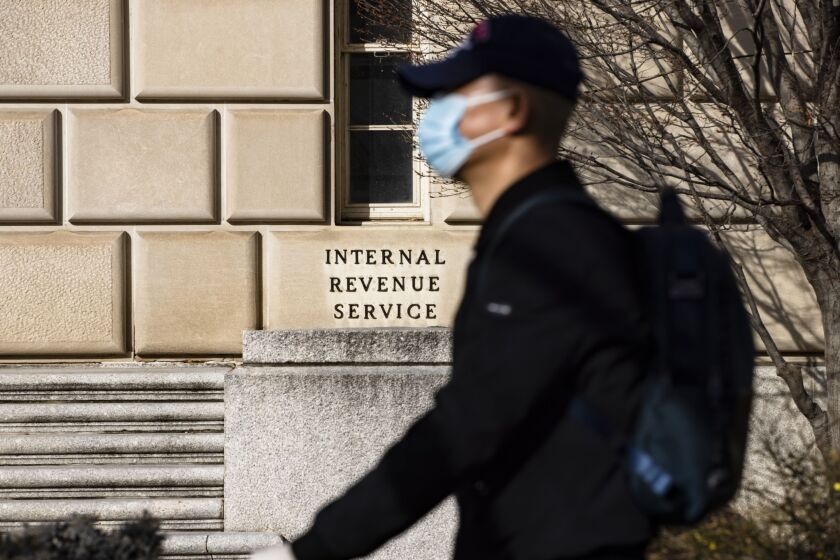The Internal Revenue Service will allow businesses that got their Paycheck Protection Program loans forgiven to write off expenses paid for with that money, shifting policy after Congress passed new legislation last month.
IRS guidance issued on Wednesday overrides previous rules that recipients of PPP loans that had been forgiven couldn’t claim deductions for the wages, rent, utilities and other expenses covered by the loans. The change came after a bipartisan move in Congress to clarify that business owners should be eligible for those tax breaks.
With more than 25 years of experience in the insurance and technology industries, George Robertson provides a seasoned perspective on emerging technological trends and their impact on insurance professionals and clients. As a former board member of the Independent Insurance Agents & Brokers of America (IIABA) Agency Council for Technology, he has played a key role in tracking strategic developments that shape consumer expectations and business opportunities.
George also served as co-chair of the Cyber Workgroup, where he helped develop The Cyber Guide for Insurance Agents, a resource designed to assist agents with cyber regulation compliance and safeguard both agencies and their customers. With expertise in cyber insurance, insurtech, artificial intelligence, and agency automation, he delivers valuable insights that drive innovation and progress within the insurance industry. He can be reached at grobertson@ncinsquote.com.
Gail McGiffin is the Managing Director and Global Insurance Advisory Lead at EPAM, where she helps insurers deliver large-scale transformation programs focused on growth, efficiency and digital innovation. With over 35 years of experience in insurance leadership, she specializes in underwriting modernization, data-driven platforms and operational efficiencies.
Before joining EPAM, Ms. McGiffin was the Chief Information and Operations Officer and board member at Vantage Group Holdings Ltd., where she led technology and operations. She previously served as Global Insurance Underwriting Lead and Partner/Principal at EY, Chief Information Officer and a member of the board of directors at ProSight Specialty Insurance and Managing Partner at Accenture, where she established and led the Global Underwriting Practice. Ms. McGiffin began her career at Chubb, holding leadership roles in underwriting and product innovation.
Justin Grooms is the president of Bolt, a checkout technology company.
The recent stimulus legislation updated the CARES Act passed in March to “say that no deduction is denied, no tax attribute is reduced, and no basis increase is denied by reason of the exclusion from gross income of the forgiveness of an eligible recipient’s covered loan,” the IRS said in a statement.

The change is widely regarded as a victory for small businesses, which can use tax-free money to generate more breaks, something that’s typically prohibited under the Tax Code. Lawmakers said allowing the deductions was necessary to keep small businesses afloat amid waves of restrictions and weakened consumer spending resulting from the coronavirus pandemic.
Some firms could pay a negative tax rate on their PPP money — meaning the tax benefits outweigh the amount of their loan. For business owners paying the top tax rate, it generally means they could save as much as $37 on their taxes for every $100 of tax-free PPP money they received.
The new guidance from the IRS stretches the money received from the government even further, said Lisa Zarlenga, a partner at law firm Steptoe & Johnson.
“The PPP loan proceeds are free, if they’re forgiven, effectively — so it’s a good benefit,” Zarlenga said.
Many small businesses expected to be able to claim the deductions based on the original CARES Act language, said Andrew Gibson, a managing partner at accounting firm BDO. Lawmakers made it clear that their intent was for companies to claim the deductions after the IRS said that they wouldn’t allow the tax breaks, he said. But IRS officials said they couldn’t update their guidance based on intent — they needed a law change, so the issue sat unresolved for months until it was included in the December stimulus legislation.
The delay in resolving the deductibility issue has created some problems for small businesses, said Michael Greenwald, a business tax leader at accounting firm Friedman. Other tax breaks — such as the 20 percent pass-through deduction, the R&D credit and the New Markets tax credit — interact with the expense write-offs, meaning that businesses are rushing to determine whether they can still qualify for other tax benefits they usually claim.
“Clients were clearly relieved when Congress passed this, but the other side of that coin is that they were unaware of the nuances,” Greenwald said. “When we tell them about those, it’s as if we are taking away their Christmas present.”
The $2.3 trillion bill providing COVID-19 relief and government funding for the fiscal year into 2021 includes $284 billion in additional funding for PPP loans, which were designed to limit a wave of small-business failures that could cripple the economy. The plan lets some businesses apply for a second round of funding if they can show losses during the pandemic. Deductions are allowed on second-round loans as well.



